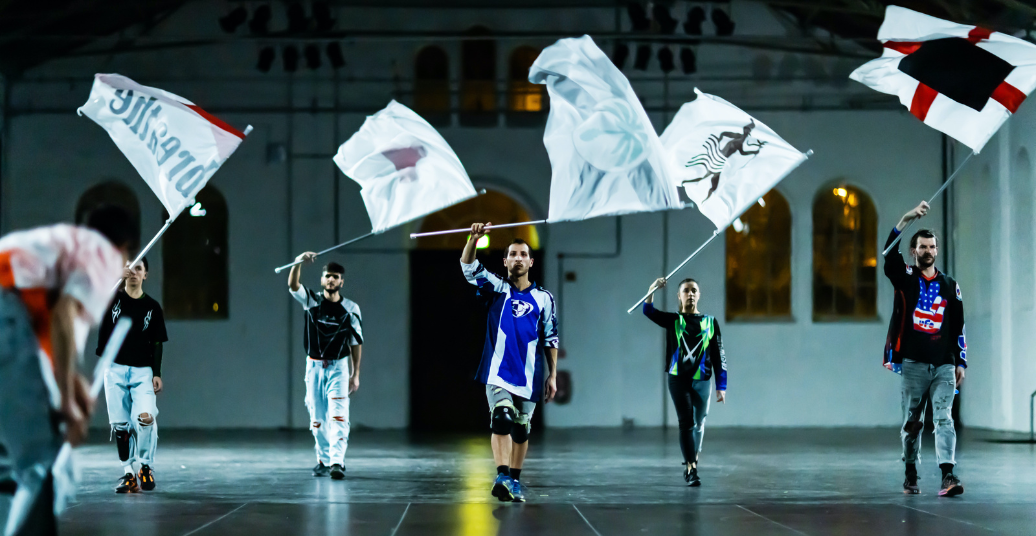Kathleen Heil (dance journalist) and Rachel Oidtmann (author / dancer) write alternately in their native languages English and German about the Tanzplattform Deutschland 2024.
As I journeyed yesterday to Freiburg from Berlin for the Tanzplattform Deutschland 2024, it was hard not to think about Bertolt Brecht’s oft-cited lines, published in 1939 when he was in exile from the Nazi regime: “In the dark times / will there also be singing? / Yes, there will also be singing. / About the dark times.”
In their opening remarks, the German Federal Government Commissioner for Culture and the Media, Claudia Roth (in a prerecorded video), and Dr. Adriana Almeida Pees, Artistic Director of Tanzplattform Deutschland 2024, alongside Martin W.W. Horn, Mayor of Freiburg (both presenting in person), spoke of the capacity of dance, in uncertain and difficult times, to bring people together in empathy and diversity. Just days after Aleksei Navalny’s death under Putin’s regime, amid the war in Ukraine and ongoing humanitarian crisis in the Middle East, what is dance—and dance in Germany—for? In the dark times, will there also be dancing about the dark times?
Moritz Ostruschnjak’s Terminal Beach inaugurated the Tanzplattform’s five-day gathering by answering this question with a resounding, and deeply unsettling (in the best sense)—yes. A work for six dancers that employs what the choreographer calls his principle of “Copy&Paste” and “Cut&Mix,” Terminal Beach was not one of those self-congratulatory works of art that rally viewers into feeling pleased with ourselves over sad things we feel good for having the right opinions about.
The piece was far more subtle, casting an implicating gaze at us, at our bodies as spectators to the spectacle. Implicit in the dancers’ movements, I felt, was the question: For those of us who live in comfortable (if slightly crumbling) Western, liberal democracies, what do we do with our bodies as our leaders perform their postures of power? Are we impassively, terminally beached on the shores of indifference?
Though there was occasional laughter from people in the audience at the dancers’ repetitive, sometimes unexpected movements—mounting the flags they held as though riding a horse, for example—it seemed to me the accumulation of body rolls and poses carried a simmering rage at our lack of discomfiture at our relative comfort. The dancers wove flags whose images were abstracted from ones we might nearly recognize from nations and corporations both big and small: a St. George’s Cross blacked out by a square, an inverted Marlboro-esque red triangle with the imperative to breathe. The dancers held these flags aloft and roller-skated across the stage to a pulsing electronic score interspersed with bomb-like bursts of sound and capital(ist) kitsch—enacting jerky moves to a snippet of Johnny Cash singing “(Ghost) Riders in the Sky” as though Charlie Brown characters trapped in the endless entertainment of their dance. The piece seemed to ask if we, the audience, our ourselves not trapped in a kind of collective complacency, as the sound of Netflix loading played on a loop toward the work’s end. There was also a thread of vulnerability running through the piece, in this case literally: Miyuki Shimizu, clad in orange, atomized urgent paths in circles and swoops at the work’s beginning and end, as if searching for our humanity amid a triumphant, willful desire to distract and amuse ourselves. A white flag appeared. A fight broke out.
I exited the theater to candles, messages, and flowers placed beneath the flags of Freiburg and the European Union, in memory of Navalny. How can our living, breathing bodies stand in meaningful responsibility to the bodies of those far more vulnerable, to those who don’t always survive the brutality enacted by others, Terminal Beach seemed to ask. At its end, the metal armor of two dancers stood and shone on the empty stage, as if in a permanent standoff. And then the performers rushed in, with their terminally vulnerable bodies, to take their bows.
As part of tanzschreiber@TPD24, a cooperation between Tanzbüro Berlin and the organizers of Tanzplattform Deutschland 2024 (dance department of Theater Freiburg), Rachel Oidtmann (author / dancer) and Kathleen Heil (dance journalist) accompanied the festival in writing. The Tanzplattform Deutschland 2024 took place from February 21-25, 2024 in Freiburg.




